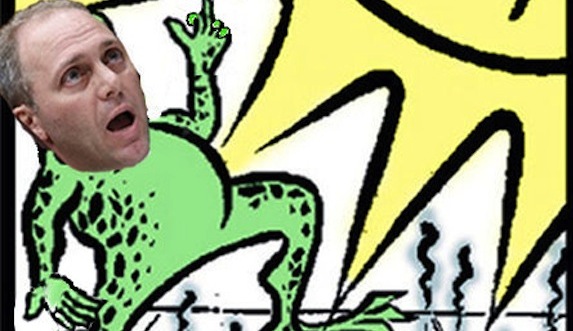
How was your Labor Day weekend? Mine was hot, dark and wet. A confounded, slow-moving tempest knocked out my electricity and exposed leaks around my windows. After a couple days of sweating and mopping up, my wife and I decided to consume all the beer in the fridge, before it got warm. Emergency measures, you see. Then on the third day, we gave up and went to stay with relatives who had working A/C.
Wait—the same sort of thing happened to you, too? What are the odds?
While the power was on, pre-storm, I watched local and state leaders deliver televised speeches. Gov. Bobby Jindal recited storm-related announcements and statistics in rapid-fire succession. No one seems to mind the speed-reading, though, because Jindal seems to understand everything he says. People crave information as a storm approaches, they say, and Jindal certainly delivers on that score. However, I wonder whether the public at-large is really concerned with, say, the number of sandbags made available at a particular location. Sure, it sounds impressive when a governor confidently spews big numbers, but I think adding a little context to the numbers is preferable. Don’t just say, “There are 24,000 sandbags available at various locations throughout Lafourche Parish.” Add something like: “This is 10,000 more than we had during Hurricane Last-time, so we don’t expect to run out.”
Overall, I was impressed with Mayor Mitch Landrieu’s relaxed but firm demeanor during the storm press conferences. Landrieu provided his share of announcements and statistics (as well as “hunker down” cliches), but he also had a surprising amount of concrete guidance and a welcome dose of humor. Mostly his directives were basic common-sense advice, such as: Don’t go outside to find out what a 70 mph wind feels like, because of the flying debris. Everyone already “knows that.” But I’ll admit, after being couped up in a hot home for two days, I was tempted to go out and frolic in the tropical winds. Then Landrieu’s voice echoed in my ear: “Don’t be a knucklehead.”
The good news is that I discovered a new way to beat the heat during a summertime storm power outage. All you have to do is remember the recent claim made by U.S. Rep. Steve Scalise, R-Kenner: Our earth is in a cooling period! That’s right, Scalise said he reviewed the latest “scientific data” and it showed the planet will “continue to cool over the next 20 years.” That’s wonderful news (especially if you ignore the fact that the first seven months of 2012 were the hottest January-to-July period ever recorded in the contiguous 48 states). So while it might be hot now, according to Scalise’s “data,” cooler days are on the way. I swear, when you’re sweating in the dark, hopeful news like that is more refreshing than a bag of ice.
Scalise denies global warming and says there’s a lack of scientific consensus on the issue. But at this point, in the face of overwhelming evidence, I think Scalise should have to define what he means by “consensus.”
It’s a serious issue. New Orleans is on the frontline of climate change impacts. As we’ve known for decades, rising sea levels and warm Gulf waters heighten storm risk factors. When you combine these threats with a rapidly eroding coastline, the future doesn’t look good for South Louisiana.
But in addition to catastrophic storm flooding, that I believe is also exacerbated by global warming, Hurricane Isaac revealed a subtler threat to our region: Over the next two decades, the New Orleans metro area will likely have larger and larger voluntary evacuations for relatively “light” storms. People will leave town for tropical storms and Category 1 hurricanes, not because of a severe flooding hazard, but because of the prospect of power outages during summers that are increasingly hot. As we know, evacuating is expensive. If people feel compelled to leave town for less severe storms, will they still have the funds to evacuate if a beastly Cat 3-plus hurricane appears later in the season?
I fear the city’s weak electrical grid, combined with the increased likelihood of hotter summers, might prompt people to evacuate for comfort—to escape the heat—and leave them in a precarious financial situation if a catastrophic storm comes along that might flood the city.
For example, say next summer you evacuate for two tropical storms early in the season. Your family budget is tight, but you say, “I’m not going to spend five summer days without power again, like I did for Isaac.” But then a late-season Cat 2 enters the Gulf, threatens to jump to Cat 3 strength and New Orleans is right in the crosshairs. Your emergency funds are entirely depleted—what do you do? I think many in this situation will decide to “hunker down” for the most dangerous of the season’s three storm.
It bears repeating that climate change doesn’t cause particular weather events. But I think higher winds and temperatures, combined with a fragile power grid, will cause more difficult hurricane season choices for New Orleanians. And there will be health and safety impacts, in addition to financial ones.
It’s frustrating that as our city’s risk of flooding has been reduced by post-Katrina levee work, a subtler threat has emerged. Will our fragile electrical grid lead to more “comfort evacuations” when lesser storms approach, and will this put New Orleanians at greater risk during the big, late-season storms?
I suspect it will. But either way, whether it’s hot summer days without A/C or the bigger threat of gulf waters supercharging a storm that will overwhelm our new levees, global warming is a contributor, if not the sole cause. And it isn’t very “cool” when our local leaders ignore these threats.

